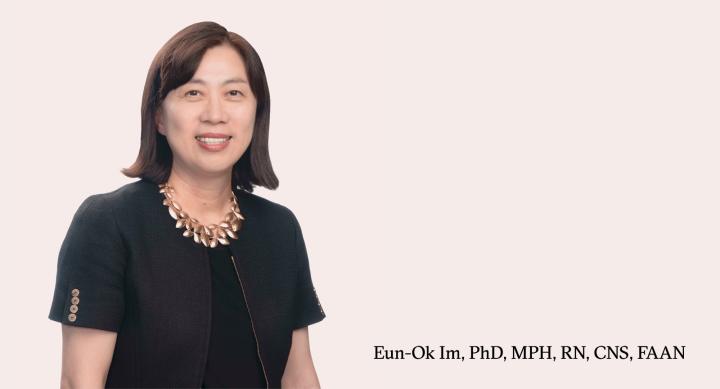
In September 2023, UT Austin welcomed back Eun-Ok Im, PhD, MPH, RN, CNS, FAAN, to serve in her new role as dean of the School of Nursing. Im is an internationally recognized nurse researcher with groundbreaking contributions in nursing science and oncology nursing.
“UT Austin was my home institution from 2002 to 2011, and I am thrilled to be back to further champion the mission and success of one of the top nursing schools in the nation,” Im said.
Im returned to the School of Nursing because of its well-known ongoing contributions to nursing education, practice, and research. She enters this role with many goals in mind. One goal at the top of her list is to increase the School’s funding from the National Institutes of Health (NIH). Passionate about research, Im wants to see faculty achieve their research goals with the funds they need. The School’s rank among other top institutions for grant funding attracts outstanding students and contributes significantly to the School’s prestige.
In addition, Im wants to improve the School’s national and global rankings. The School of Nursing is already one of the nation’s leading nursing schools, with a strong history of excellence in academics, research, and service, but it can be ranked even higher. Internationally, people are aware of the School of Nursing and they know it’s a top school, but improvement is always possible.
The School of Nursing recognizes the growing demand for highly qualified nurses in leadership roles, clinical care, teaching and research, and Im is prepared to help continue moving the School forward in preparing our future Texas Nurse leaders.
“Through my role as dean, I know we will strengthen our research efforts and opportunities to advance nursing science and raise future generations of excellent nurses — ultimately providing better care for all,” Im said.
Im has returned to Texas after serving as the senior associate dean for research and innovation and the Edith Folsom Honeycutt Endowed Chair in the Nell Hodgson Woodruff School of Nursing at Emory University in Atlanta, as the associate dean for Research Development and Regulatory Affairs and the Mary T. Champagne Professor at Duke University, and as the Marjorie O. Rendell Endowed Chair at Penn Nursing. Before that, from 2007 to 2011, she was the La Quinta Motor Inns Inc. Centennial Professor in Nursing at UT Austin.
Her research career began after a tragic incident while she was working as an oncology nurse in South Korea.
At that time, Im had a patient with terminal-stage pancreatic cancer who was approaching the end of life. Although he was receiving opioids for his extreme pain, he never complained about his pain. When the nurses walked past his room, they assumed he was doing OK, even though he looked solemn and they knew that he must be suffering.
The patient was located in a special care unit, near the top of the hospital building, that was reserved for VIPs and other important figures. One day, he asked to be moved to a single suite, which was usually reserved for patients like the president of Korea or other high-ranking dignitaries, and the nurses agreed because they knew he was reaching the end of life and wished for a peaceful time with his family. As soon as he was relocated, he asked his wife to run some errands for him. Once he was alone, he used a large chair in the hospital room to break a window, and he jumped to his death.
“It was a disaster,” Im said. “As an oncology nurse, I wasn’t working that shift. I didn’t witness it, but when I came back the next day, the police were there, and everybody was shocked. We talked about it over and over again.”
The nurses concluded that the patient’s cultural beliefs and values likely led him to think of suicide. Korean culture tends to emphasize a stoic view of pain, such that patients may endure it without showing their feelings or complaining. One Korean proverb states that men should not express pain or emotions, or even cry: Men should cry only three times in their lives — at birth, when their parents die and when their country collapses. Im’s patient hid his pain and never complained; but in the end, it was too much for him to bear.
Im says that it is important to educate individuals about pain, to inform them about pain medication and let them know it is natural to experience pain.
“We should respect cultural values, but in terms of health and well-being, there’s a line that we should cross to intervene and prevent cultural values and beliefs from making people suffer,” she added.
After that tragic accident, Im knew she wanted to make a difference, and so she began her research career with the goal to develop interventions specifically for Asian Americans. She developed internet and computer technology to address ethnic disparities in women’s health. Her metatheoretical approach — situation-specific theory — has become a basis for nursing interventions for underrepresented ethnic minority women.
Im’s research career has included 74 funded studies totaling $190 million over the past 25 years, and she has been the principal investigator on several major NIH projects. She has shared the results of her research in over 450 publications.